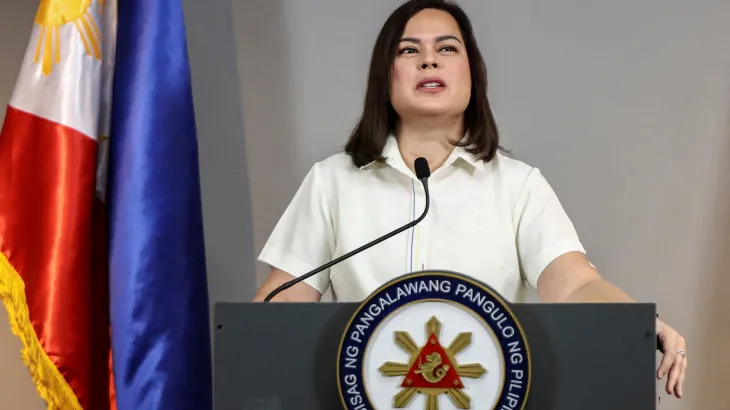Sara Duterte: A Legacy of Grit, Grace, and Governance

The Rise of a Reluctant Leader
In a country where politics often runs in the bloodline, Sara Duterte’s journey is anything but typical. Born into the political dynasty of Davao City’s Duterte family, many assumed that she would naturally follow the trail blazed by her father, Rodrigo Duterte. Yet, Sara’s path has been marked not by blind inheritance, but by conscious rebellion, calculated leadership, and a quiet, yet fierce, sense of purpose.
As the eldest daughter of the former Philippine president, expectations loomed over her from an early age. However, she didn’t immediately jump into politics. Before she was a politician, she was a lawyer—a defender of justice who chose to build her foundation in law rather than leverage her name. That decision laid the groundwork for a different kind of leadership: one rooted in principle, discipline, and resilience.
The Journey of Sara Duterte: From Davao to the National Stage
Breaking Out from the Shadow
Sara Duterte’s early political years were marked by a strong desire to carve out her own identity. She became Vice Mayor of Davao City in 2007, running alongside her father, who was then serving as mayor. It was her training ground—one that taught her the complexities of local governance and the unique pressures that come with being both a leader and a Duterte.
Her boldest move came in 2010, when she ran for Mayor of Davao City, this time without her father in the executive seat. In that election, she made headlines not just for winning, but for what she represented: the beginning of a new Duterte brand—less incendiary, more pragmatic, and deeply focused on community-level impact.
The Punch Heard Across the Nation
No story about Sara Duterte’s early leadership is complete without mentioning the infamous 2011 incident where she punched a court sheriff in public. The sheriff had proceeded with a demolition despite her appeal for delay. For some, it was a scandal. For others, it was a rare display of fierce empathy—a leader putting herself physically between her constituents and what she deemed an injustice. The act, controversial as it was, solidified her reputation as someone unafraid to take drastic action to protect her people.
A Return and a Reinvention
After taking a hiatus from politics in 2013, Sara made a strong comeback in 2016 as Davao City mayor. This time, her leadership was more refined. She launched initiatives to strengthen education, healthcare, and disaster preparedness in the city. Notably, she initiated “Lingap para sa Mahirap,” a medical assistance program that became a model for other cities.
She also co-founded the regional political party Hugpong ng Pagbabago (HNP), broadening her influence beyond Davao and establishing herself as a national player. It wasn’t long before speculation began swirling about a possible run for higher office.
Sara Duterte: A Rising Star in National Politics
In 2022, Sara Duterte took the leap into national politics, running for Vice President of the Philippines under a coalition that combined the forces of the country’s most powerful political families. It was a moment that divided critics and admirers alike. Was she leveraging her name, or was this the next logical step for a proven local executive with national vision?
Her vice presidential campaign was built on themes of unity, service, and continuity. Though often reserved in the public eye, she resonated with voters through her track record, not rhetoric. She won by a landslide, garnering over 32 million votes—the most ever for a vice-presidential candidate in Philippine history. It was a staggering show of support, affirming that her leadership style, though distinct from her father’s, had carved its own powerful lane.
A Leader of Quiet Strength
Embracing Education and Defense
As Vice President, Sara Duterte took on the role of Secretary of Education—a position both symbolic and strategic. Education in the Philippines has long been plagued with challenges, from outdated curricula to underpaid teachers. Stepping into this role, she faced both scrutiny and anticipation.
She approached the post not with sweeping pronouncements, but with deliberate steps. Her early months saw a push for the resumption of face-to-face classes in the aftermath of the COVID-19 pandemic, a controversial yet crucial decision for educational continuity. She emphasized the need for discipline and patriotic values in schools, drawing both applause and criticism.
In parallel, she also took on defense-related initiatives, participating in talks about national security and modernization. These dual roles revealed her broader vision: a nation built on strong minds and secure borders.
The Balancing Act
Sara Duterte’s political persona is a paradox—firm yet soft-spoken, powerful yet reserved. Unlike her father’s firebrand style, she prefers calculated moves and avoids unnecessary controversy. Her ability to balance the demands of national leadership while maintaining ties to her Davao roots speaks volumes about her political dexterity.
She is also a mother, and she does not hide it. Her speeches often reference her children, and her approach to public service frequently echoes parental concern—a desire to build a better country for the next generation. This human element adds depth to her leadership and endears her to many Filipinos, especially women.
Challenges and Criticisms
No leader is without critics, and Sara Duterte is no exception. Her appointment as Secretary of Education raised eyebrows, with some questioning her qualifications. Others expressed concern over her emphasis on discipline and nationalism, fearing it could stifle critical thinking.
Additionally, her alliance with former political rivals, including the Marcos family, drew mixed reactions. To some, it was a pragmatic move in a fragmented political landscape. To others, it signaled a compromise of principles.
But to her supporters, these are the realities of governance. In their view, Sara Duterte is playing the long game—making strategic choices not for short-term approval but for long-term stability.
Leadership Reimagined
Sara Duterte’s leadership marks a new chapter in Philippine politics. She blends the tenacity of traditional power with a modern touch. Her policies reflect local sensibilities, and her demeanor projects a calm strength.
Unlike many of her contemporaries, she does not thrive on spectacle. Instead, she focuses on results. Whether in managing the educational sector or supporting national security, she leads with a clarity that’s becoming increasingly rare in today’s political theater.
She is also subtly redefining what it means to be a female leader in a largely patriarchal system. Her presence in high-level meetings, her control over her political narrative, and her ability to command respect without raising her voice, all speak to a leadership style that is both quietly powerful and undeniably effective.
The Road Ahead
The question on everyone’s mind is whether Sara Duterte will run for president in the next election. It’s a logical trajectory, but one she hasn’t confirmed. Still, the groundwork is being laid—through her growing political alliances, her national visibility, and her measured yet meaningful public engagements.
If she does choose to run, she will likely present a compelling case: a blend of local governance experience, national-level execution, and a personal story of perseverance and pragmatism.
What’s clear is that Sara Duterte is not content with legacy alone. She is building her own narrative—one that goes beyond her family name and taps into a deeper calling to serve.
Conclusion: The Legacy in Motion
Sara Duterte is more than the daughter of a president. She is a complex, calculated, and compassionate leader navigating a political landscape that demands both strength and subtlety. Her rise from Davao mayor to Vice President of the Philippines isn’t just a story of inherited influence; it’s a story of intention, transformation, and emerging national relevance.
In an era where politics is often marred by noise and division, she stands as a figure of composed conviction. Whether you agree with her politics or not, one thing is undeniable: Sara Duterte is shaping the future of the Philippines in her own distinct and deliberate way.
And in doing so, she’s reminding the nation—and the world—that leadership isn’t always loud. Sometimes, it moves with quiet determination, reshaping history one decision at a time.





